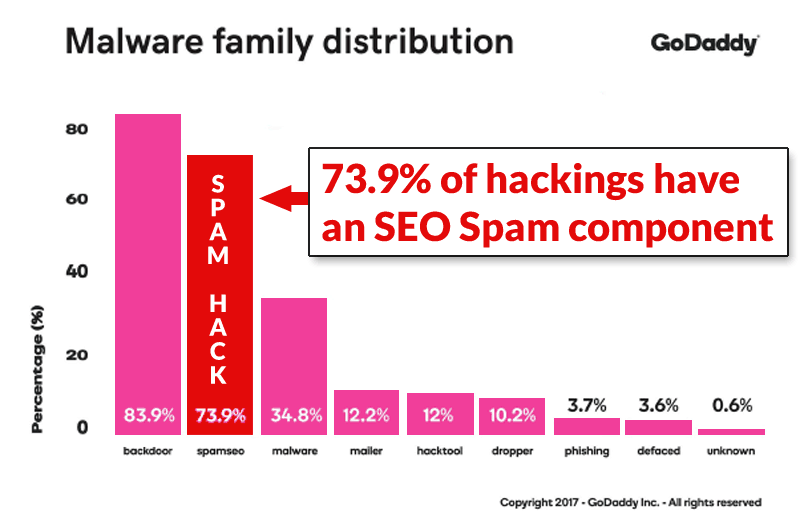Why is website security more vital to SEO now? Google search console has added the ability to remove xml sitemaps. Why this is so important, is if an attacked gains access to your website, they then have access to your website directory. They can add files and remove files, which means, they can add google verification files, and be added as a user to google search console. Once they have access, they can add new sitemaps or worse, remove already established sitemaps. Once they add their sitemaps, they can apply an .htaccess rule, to redirect all urls on that domain, to any domain they want, a SERPs Hijacking. This is called negative SEO and it’s a growing blackhat SEO threat, both from automatic scripted attacks and manual attacks.
Poor website security can also cause other issues, that many times, the attacker tries hard to hide. Often, hackers don’t want to be seen, since a functional website, is more of a target than a defunct website, due to the amount of data input by users. However, skills lack even in hackers and SEO is not many website intruders 1st trained talent, and mistakes are made. When increases in 404 pages arise, not only is this a tip off to a greater issue, but also slows down a website and limits searchbot crawling, which in turn slows website indexing. Once website indexing is slowed, keyword ranking starts to tank and organic web traffic soon follows. It’s a very fragile ecosystem of variables all playing off one another, and even the simple 404ing of webpages, can be cause for organic web traffic loss.
A Secured Website Is A SEO Ranking Factor
Since 404 webpage errors can play such a role in website indexing and thus organic traffic. Its not too hard to understand website security as a on page SEO ranking factor. Especially since 404 pages are the least of a hacked website’s concerns. If a website has been hijacked in SERPs, the SEO has been hijacked to focus on another industry / domain, effectively your own SEO has been hijacked to help someone else’s domain rank keywords, which is the ultimate betrayal. Competitors have even hacked rivals and sabotaged keyword targeting and website indexing. The endless list of dirty tricks goes on an on, but what it’s vital to know is that it’s not just an issue to website data, but also overall web presence that will need to be recovered.

Since most hacks have an SEO underlying issue, it’s pretty safe to say hacking and SEO are related pretty closely. Its actually how blackhat SEO survives and has turned into a billion dollar industry in the last 10 years. Most spam websites are part of much bigger private blog networks, which operate as backlink components in yet even larger backlink farms. Because Google has weighted backlinks so heavily in keyword ranking, blackhat SEO tactics include buying backlinks or building fake websites that link out to legit websites. This is just one in many aspects of blackhat SEO services operating presenting, and successfully as well. However, Google doesn’t let such things sit idle, in fact, change is part of their anti-web spam strategy. Some day, backlinks will be readjusted again, to devalue these pbns and I’ve dub this forthcoming day, Backlinkageddon, that day will be another day like the penguin algorithm update.
How To Protect Against Website Hacking
Nothing is 100% safe from being hacked, its that simple, if there is a will, there is a way. History has shown us that much at least. There is a 100% effective solution to combat website hacking, regular daily website backups, and NEVER OVERWRITE OLD BACKUPS! That’s the key thing to highlight, because each backup, is in itself a single saved copy of your website without any extra files other than what you added. Meaning, you know it’s safe, and trusted, no matter what. When websites get hacked, there are only so many ways it can be done. Via your credentials, password and username logins or adding files to the domain, via instructions from another file that was able to be added to the website via vulnerabilities.
Other ways to protect against website hacks, is regularly updating any software used, every time there is an update, not when it’s convenient. That single outdated software, will be the way in for a hacker to ruin your website and hard work. Passwords are yet another way websites are compromised, that’s why user management is crucial for websites, especially if agencies are involved. A level of accountability needs to be determined, when multiple users are involved with a website, otherwise security holes will be created and a website will be compromised. Even 3rd party extensions and tools can be used to gain access to websites, so always check the backgrounds of software you use. There is no such thing as an unhackable anything, there is always a way to get something done, it’s just a matter of connecting the right variables.
If you believe you’re website has been hacked or are not sure, many times an SEO audit can tell you if you’ve been hacked. Contact SEOByMichael and ask about having a website audit today!


